Currently selling all of my A level notes for CIE (International Cambridge Examinations)
Arguably the most difficult exam board, CIE is a struggle for even the best of us. My teachers predicted I would get C's and D's in my A levels, which pushed me to find new ways to study and write up my notes. I ended up getting all A's and going to my university of choice (Uni of Bath): who had previously denied my entry based on my previous grades. I want to share my work with others because I know for a fact It can help others achieve the same :)
- 47
- 0
- 2
Community
- Followers
- Following
8 Reviews received
49 items
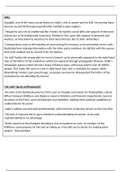
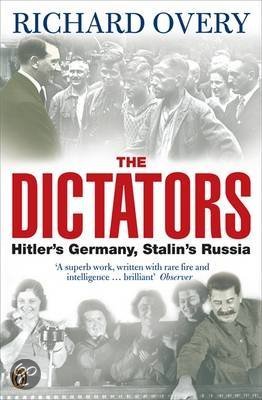
FLASHCARDS - STALIN (32 Pages)
Stalin; formerly known as Iosif Vissarionovich Dzhugashvili, was a Marxist and an avid follower of Vladimir Lenin. His involvement in the Bolshevik movement was due to his active violent attacks on the Tsarist government, through bank robbing and kidnapping to fund the revolution, allowing him to become one of Lenin’s closest associates. Despite his early success within the Bolsheviks, he was not considered to be among the list of natural successors; Trotsky, Bukharin, Zinoviev, Kamenev and Ki...
- Book & Paket-Deal
- Study guide
- • 35 pages •
Stalin; formerly known as Iosif Vissarionovich Dzhugashvili, was a Marxist and an avid follower of Vladimir Lenin. His involvement in the Bolshevik movement was due to his active violent attacks on the Tsarist government, through bank robbing and kidnapping to fund the revolution, allowing him to become one of Lenin’s closest associates. Despite his early success within the Bolsheviks, he was not considered to be among the list of natural successors; Trotsky, Bukharin, Zinoviev, Kamenev and Ki...
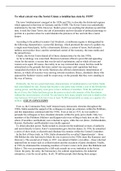

Essay - Totalitarianism
Stalin; formerly known as Iosif Vissarionovich Dzhugashvili, was a Marxist and an avid follower of Vladimir Lenin. His involvement in the Bolshevik movement was due to his active violent attacks on the Tsarist government, through bank robbing and kidnapping to fund the revolution, allowing him to become one of Lenin’s closest associates. Despite his early success within the Bolsheviks, he was not considered to be among the list of natural successors; Trotsky, Bukharin, Zinoviev, Kamenev and Ki...
- Book & Paket-Deal
- Essay
- • 2 pages •
Stalin; formerly known as Iosif Vissarionovich Dzhugashvili, was a Marxist and an avid follower of Vladimir Lenin. His involvement in the Bolshevik movement was due to his active violent attacks on the Tsarist government, through bank robbing and kidnapping to fund the revolution, allowing him to become one of Lenin’s closest associates. Despite his early success within the Bolsheviks, he was not considered to be among the list of natural successors; Trotsky, Bukharin, Zinoviev, Kamenev and Ki...
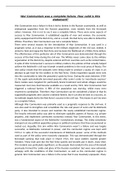

Exam Question - Was War Communism a Success?
A totalitarian state, is a where the central government of a state does not tolerate any parties with opposing views and exercises complete dictatorial rule over all or most aspects of life. Lenin, the leader of the Bolsheviks, took many measures in an attempt to create a totalitarian state, including the dissolution of Constituent Assembly, the use of decrees and the establishment of a secret police group called the Cheka. However there were also some ways in which he failed to achieve full tot...
- Book & Paket-Deal
- Summary
- • 2 pages •
A totalitarian state, is a where the central government of a state does not tolerate any parties with opposing views and exercises complete dictatorial rule over all or most aspects of life. Lenin, the leader of the Bolsheviks, took many measures in an attempt to create a totalitarian state, including the dissolution of Constituent Assembly, the use of decrees and the establishment of a secret police group called the Cheka. However there were also some ways in which he failed to achieve full tot...


Presentation - War Communism and NEP
A totalitarian state, is a where the central government of a state does not tolerate any parties with opposing views and exercises complete dictatorial rule over all or most aspects of life. Lenin, the leader of the Bolsheviks, took many measures in an attempt to create a totalitarian state, including the dissolution of Constituent Assembly, the use of decrees and the establishment of a secret police group called the Cheka. However there were also some ways in which he failed to achieve full tot...
- Book & Paket-Deal
- Presentation
- • 11 pages •
A totalitarian state, is a where the central government of a state does not tolerate any parties with opposing views and exercises complete dictatorial rule over all or most aspects of life. Lenin, the leader of the Bolsheviks, took many measures in an attempt to create a totalitarian state, including the dissolution of Constituent Assembly, the use of decrees and the establishment of a secret police group called the Cheka. However there were also some ways in which he failed to achieve full tot...


Exam Technique for Lenin Question
A totalitarian state, is a where the central government of a state does not tolerate any parties with opposing views and exercises complete dictatorial rule over all or most aspects of life. Lenin, the leader of the Bolsheviks, took many measures in an attempt to create a totalitarian state, including the dissolution of Constituent Assembly, the use of decrees and the establishment of a secret police group called the Cheka. However there were also some ways in which he failed to achieve full tot...
- Book & Paket-Deal
- Summary
- • 12 pages •
A totalitarian state, is a where the central government of a state does not tolerate any parties with opposing views and exercises complete dictatorial rule over all or most aspects of life. Lenin, the leader of the Bolsheviks, took many measures in an attempt to create a totalitarian state, including the dissolution of Constituent Assembly, the use of decrees and the establishment of a secret police group called the Cheka. However there were also some ways in which he failed to achieve full tot...


Simple Notes - Lenin NEP Successes and Failures
A totalitarian state, is a where the central government of a state does not tolerate any parties with opposing views and exercises complete dictatorial rule over all or most aspects of life. Lenin, the leader of the Bolsheviks, took many measures in an attempt to create a totalitarian state, including the dissolution of Constituent Assembly, the use of decrees and the establishment of a secret police group called the Cheka. However there were also some ways in which he failed to achieve full tot...
- Book & Paket-Deal
- Summary
- • 2 pages •
A totalitarian state, is a where the central government of a state does not tolerate any parties with opposing views and exercises complete dictatorial rule over all or most aspects of life. Lenin, the leader of the Bolsheviks, took many measures in an attempt to create a totalitarian state, including the dissolution of Constituent Assembly, the use of decrees and the establishment of a secret police group called the Cheka. However there were also some ways in which he failed to achieve full tot...
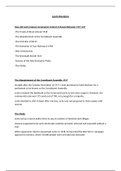

Simple Notes - How did Lenin Impose Communist Control
A totalitarian state, is a where the central government of a state does not tolerate any parties with opposing views and exercises complete dictatorial rule over all or most aspects of life. Lenin, the leader of the Bolsheviks, took many measures in an attempt to create a totalitarian state, including the dissolution of Constituent Assembly, the use of decrees and the establishment of a secret police group called the Cheka. However there were also some ways in which he failed to achieve full tot...
- Book & Paket-Deal
- Summary
- • 3 pages •
A totalitarian state, is a where the central government of a state does not tolerate any parties with opposing views and exercises complete dictatorial rule over all or most aspects of life. Lenin, the leader of the Bolsheviks, took many measures in an attempt to create a totalitarian state, including the dissolution of Constituent Assembly, the use of decrees and the establishment of a secret police group called the Cheka. However there were also some ways in which he failed to achieve full tot...
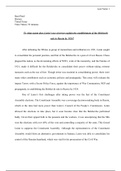

Essay - Establishment of Bolshevik Rule
A totalitarian state, is a where the central government of a state does not tolerate any parties with opposing views and exercises complete dictatorial rule over all or most aspects of life. Lenin, the leader of the Bolsheviks, took many measures in an attempt to create a totalitarian state, including the dissolution of Constituent Assembly, the use of decrees and the establishment of a secret police group called the Cheka. However there were also some ways in which he failed to achieve full tot...
- Book & Paket-Deal
- Essay
- • 4 pages •
A totalitarian state, is a where the central government of a state does not tolerate any parties with opposing views and exercises complete dictatorial rule over all or most aspects of life. Lenin, the leader of the Bolsheviks, took many measures in an attempt to create a totalitarian state, including the dissolution of Constituent Assembly, the use of decrees and the establishment of a secret police group called the Cheka. However there were also some ways in which he failed to achieve full tot...
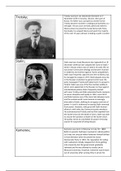

Russian Politician Biographies
A totalitarian state, is a where the central government of a state does not tolerate any parties with opposing views and exercises complete dictatorial rule over all or most aspects of life. Lenin, the leader of the Bolsheviks, took many measures in an attempt to create a totalitarian state, including the dissolution of Constituent Assembly, the use of decrees and the establishment of a secret police group called the Cheka. However there were also some ways in which he failed to achieve full tot...
- Book & Paket-Deal
- Summary
- • 3 pages •
A totalitarian state, is a where the central government of a state does not tolerate any parties with opposing views and exercises complete dictatorial rule over all or most aspects of life. Lenin, the leader of the Bolsheviks, took many measures in an attempt to create a totalitarian state, including the dissolution of Constituent Assembly, the use of decrees and the establishment of a secret police group called the Cheka. However there were also some ways in which he failed to achieve full tot...

Essay - To what extent had the lives of German people improved by 1941?
Extended Notes - Stalin's Rise to Power
Presentation - War Communism and NEP
Simple Notes - How did Lenin Impose Communist Control
Consolidation of Power